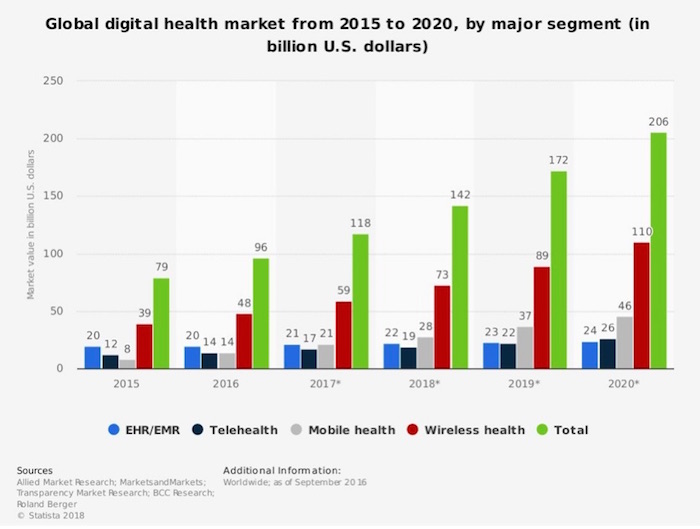Healthcare software not only helps patients keep up with seeing doctors on time, but also it helps doctors provide the best healthcare service possible. Thus, developing a healthcare application can be a great idea for your business. Especially considering the fact that the digital healthcare market is expected to reach $206 billion by the end of 2020, specifically in terms of mobile and wireless technologies. You can see this in the infographic below.
But what do you need to create a high-performance and attractive application for a healthcare organization? Considering the importance of every single aspect of work in the healthcare industry, you should contact healthcare application development professionals who will provide you with detailed advice on developing healthcare software. However, before you do so, you can get a process overview and a couple of useful recommendations from this article.
To begin, let’s briefly list the types of healthcare applications:
- Unique custom medical applications
- Electronic Medical Records (EHR) applications
- Urgent care apps
- Medical diagnostic software
- Apps for setting an appointment
- Hospital management software
- Healthcare CRM
- E-Prescription
- Telemedicine
You can read more about each of them here, and now we will move on to useful tips on developing medical software. In general, these tips are to some extent applicable to the development process of any application, but we will consider them in the context of the medical industry.
What should be considered when developing a healthcare application?
Determine primary and secondary functionality
Different types of applications also have differences in their functionality. In case you need a doctor appointment application, you need to develop and integrate user-friendly registration and profile creation, an appointment-setting interface, online prescriptions, payment, and so on. If you want a marketplace app, your functionality should also include processing large data, geographic location, booking, payment, etc.
Secondary functions may be handy, but not as important. We recommend that you consider which features should be integrated into the application and which additional features may make it better than other applications on the market. Also, think about the implementation of some advanced technologies such as artificial intelligence, machine learning, and blockchain, as they may become your powerful competitive advantage.
Include notifications, reminders, and other features
No matter what type of medical application you want to create, some features such as notifications, trackers, and calculators will hit a bullseye. If it is a software for medical consultations and meetings, then notifications about new doctors, schedules, and location changes will be a huge plus for the app because of the increased user confidence.
Make a quality UI/UX design
In the case of healthcare software, this factor is particularly important. Because when it comes to medical data and health for users, it is extremely vital that all information is easy to find, navigation is convenient, the application is easy to use, and it doesn’t create difficulties for doctors and, especially, for patients.
Potential users can be people with disabilities and it is important to take this into account when developing an app. For example, when choosing colors for an interface, you need to make the colors contrast. However, be careful with the primary colors for the application, because some combinations can create distractions and misunderstandings among users (for example, make the text unreadable). Also, remember that colors that are too bright can irritate application users.
Data protection
Applications that involve a doctor-patient relationship usually have a large database of patients, with their personal information, symptom history, test results, prescriptions, etc. Losing or damaging this data can seriously harm your business and the health of your application users. Note that it is better to rely on the experience of your development team to find solutions for data processing and storage, as your solution must be both advanced and reliable. Blockchain technologies may help since information there is virtually impossible to change, so it’s a surefire way to keep data about patients, prescriptions, and other sensitive records safe.
Any information leak can not only damage the company and its reputation, but also lead to numerous lawsuits by users of the application. Thus, carefully select the development team, because the quality of data protection will depend on how good and thoughtful these specialists are.
Be aware of medical application development standards in different countries
The rules and regulations for creating a healthcare application are quite strict, because some applications are subject to data privacy laws. Some medical applications must be HIPAA compliant and provide the highest level of privacy and security for user data (doctors must only have access to their patients’ information).
Synchronization of data and processes
Depending on the type of application, it is necessary to consider and integrate the system to synchronize information. For example, if it is a marketplace where people can order drugs, the system should keep the information about the current status of the supply in the warehouse up to date. The same applies to changes in the patient’s medical history (adding new test results, changing prescriptions, etc.).
Major reasons why some healthcare applications fail
Bad UX/UI
If the user interface of your healthcare application is unreasonably complex, users cannot cope with it and intuitively use your application, so your chances of success are slim. This is why you should search for UI/UX healthcare designers who focus on an attractive and thoughtful UX.
Lack of skills
If a software development company doesn’t have a high level of skills in developing applications for healthcare, your application will not be successful because it will be created without considering important nuances. In addition, it would be an excellent option to hire a medical specialist.
Target audience isn’t defined correctly
You need to correctly determine for whom the application is being made. This is because what works for a medical center may not work for a large clinic. Also, you need to ensure that the medical application complies with local privacy rules, depending on the region for which you are creating the application.
The app hasn’t been tested properly
A medical application must pass all necessary types of testing because if it contains a lot of errors and failures, it may even cost someone’s life. Incorrect results and diagnostics will be a serious problem for patients and doctors, which is why you must ensure that QA services are performed adequately.
Conclusion
To sum this all up, while developing an application for healthcare may seem like quite a daunting task, nothing is impossible if you have a good team of specialists with you. The main thing is to choose them wisely and then your app won’t require first tech aid.
Find a Home-Based Business to Start-Up >>> Hundreds of Business Listings.


















































